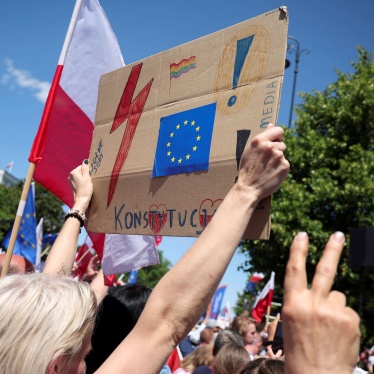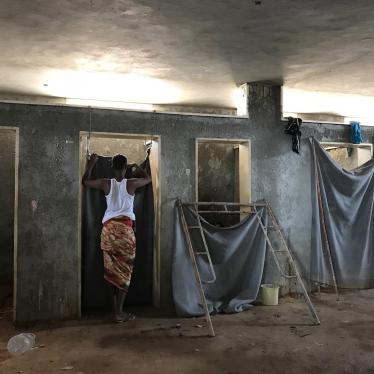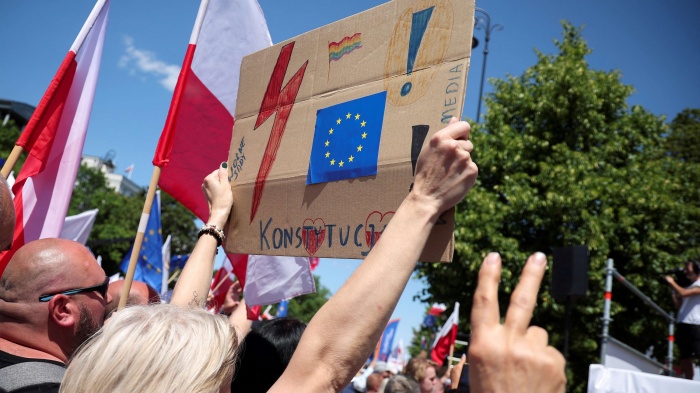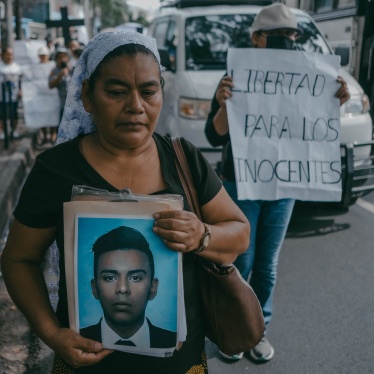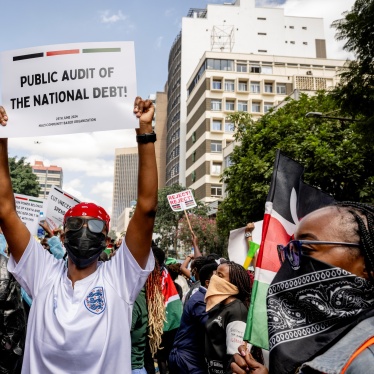Dear Prime Minister and Candidate-designate for High Representative for Foreign Affairs and Security Policy Kaja Kallas,
We congratulate you on your nomination for the post of EU High Representative for Foreign Affairs and Security Policy/Vice-President of the European Commission by the European Council. We very much look forward to working with you in ensuring that the EU’s foreign policy contributes to the advancement of human rights, fundamental freedoms and the rule of law, in line with article 21 of the Treaty on European Union.
If confirmed, your term would come at a critical juncture, marked by increased instability and conflicts in which civilians are exposed to grave rights violations, emboldened and entrenching authoritarianism, and growing attacks on independent international mechanisms and multilateral institutions.
While the world’s attention is largely focused on Ukraine and the Middle East, violent conflicts are also raging elsewhere, including in Sudan, Myanmar, Eastern Democratic Republic of Congo, and Syria, with little regard for humanitarian principles, the laws of war and the suffering inflicted on civilians. Situations of large-scale repression, like in Belarus, Russia, Azerbaijan, Iran, Egypt, Venezuela, and protracted human rights crisis, like in Haiti or Afghanistan, deserve continued attention. Large global powers, including Russia and China, and emerging powers such as Saudi Arabia, the United Arab Emirates and India, are showing growing disregard for their human rights obligations and little support for, or outright damage to, the international human rights system.
Authoritarian and anti-democratic tendencies are on the rise both within the EU, challenging the bloc’s commitment to the promotion of human rights and democracy in its foreign policy, and among some of its closest political partners. The climate crisis, growing global inequalities and new technologies present new challenges that a declining multilateral system is struggling to adequately respond to.
The European Union and its member states have played a key role in promoting human rights and protecting and supporting civil society and human rights defenders across the globe, both bilaterally and in international organizations. However, the unanimity rule in foreign policy, blatant double-standards, and increasing resort to transactional diplomacy – in which the EU opts for short-term political gains to the detriment of human rights – are undermining the EU’s stance as a strong global actor for rights.
We hope that during the transition period and, once confirmed, during your term as High Representative, you will show the commitment and leadership needed to ensure that the EU takes all necessary measures to address these global challenges in a consistent and principled way. In particular, we would like to encourage you to:
- Confront double standards and commit to thoroughly address human rights and international humanitarian law (IHL) violations wherever they occur and whichever the perpetrator, in line with EU treaty obligations, the EU’s Action Plan on Human Rights and Democracy, and EU human rights guidelines. To maintain its moral leadership and credibility, the EU should be a vocal and coherent human rights advocate, consistently press for accountability and genuine human rights reforms, and tie its relations with third countries to tangible human rights progress. Not doing so, or doing it only selectively, would undermine the EU’s credibility as a principled foreign policy actor, foster a sense of impunity among repressive or authoritarian leaders thus undermining its own security, and betray the expectations of civil society actors and human rights defenders, who spare no effort, often at great personal risk, to defend rights and promote justice.
- Advocate for the proposal to shift from unanimity to qualified majority voting (QMV) in EU foreign policy on human rights. In 2020, High Representative Borrell proposed to the European Council to adopt the 2020-24 action plan on human rights and democracy as a “strategic interest” of the EU, and to decide to act by QMV instead of unanimity on issues falling under the Action Plan. Several member states have supported the call, but the necessary consensus has not been reached yet. Misuse of unanimity by a few states remains a major obstacle to swift and resolute EU action to address human rights crises and is one of the reasons for perceived EU double standards. We encourage you to work towards creating consensus for this proposal as a key priority during your mandate. Pending that, we urge you to encourage the use of QMV when legally possible under the ‘passerelle clause,’ promote constructive abstention by member states and back human rights initiatives taken by a large majority of EU member states. We also encourage you to mandate the EEAS to be ambitious and proactive in its work to address human rights and IHL violations around the world with no exception, ensuring strict adherence to the action plan in all draft proposals, conclusions, statements or strategies they draft or targeted sanctions they work on.
- Address the assault on human rights and the international rules-based order by global and regional powers. The EU should spare no effort to counter and contain repression even in the most difficult contexts, such as Russia, and support civil society and human rights defenders as an investment in a democratic future. The EU should also draw lessons from its difficult Russia experience that failure to address unrelenting repression in a global or regional power can have profound international consequences, including for its own security. In this perspective, the EU should revise its China strategy and use all foreign policy tools, such as targeted sanctions and leadership at the UN, to address the Chinese government’s crimes against humanity in Xinjiang and other serious violations in Tibet, Hong Kong and elsewhere. Instead of continuing an impactless human rights dialogue, the EU should design more forceful, effective and adequate responses to Beijing’s crimes and intensified repression. We are also concerned about the EU’s silence on repression in other rising regional powers such as India, Saudi Arabia or the UAE, with persistent reluctance to resort to public diplomacy and over-reliance on largely fruitless human rights dialogues. The EU’s complex partnerships with regional powers like Turkey or energy providers such as Azerbaijan have muted its criticism of growing repression and widespread crackdowns on civil society, media and critical voices. Under your leadership, the EU should consider the long-term cost of its approach with global and regional powers and commit to speak up and act resolutely to address their human rights abuses at home and abroad.
- Unequivocally support international justice and the fight against impunity for the most serious international crimes in Ukraine, the Middle-East and elsewhere. The EU and its member states should continue to support justice efforts domestically and internationally for grave international crimes, doubling down on their investment in war crimes accountability for Ukraine and Israel-Palestine and support to the implementation of International Criminal Court (ICC) warrants. This also includes providing the ICC with consistent political, practical, and financial support through its regular budget, to ensure the court can effectively execute its mandate across all the situations on its docket. The EU and its member states should also protect the court from any efforts to undermine its independence or mandate, in line with the Council conclusions of July 2023. This includes publicly condemning threats and attacks against the ICC, its officials, and those cooperating with it, and using concrete tools, such as the EU blocking statute, to minimize the impact of any potential sanctions or other measures aimed at thwarting the work of the court. The EU should react forcefully and unequivocally to attempts by some of its own member states to undermine the work of the court.
- Maintain leadership and support principled actions in multilateral and regional fora. The EU and its member states have commendably led critical action on thematic and country-specific resolutions at the UN Human Rights Council and UN General Assembly and supported initiatives by others. They remain a leading actor in strengthening the response by the Council of Europe to hold its member states to account for rule of law and rights violations. Yet multilateralism is increasingly vulnerable to attacks by governments hostile to human rights. We call on you to ensure the EU redoubles efforts to strengthen and protect from attacks international and regional institutions that combat impunity, protect civic space and strengthen human rights frameworks. The EU should also support action in such fora on all situations that require their attention, genuinely follow-up on recommendations of independent investigative or monitoring bodies and address concerns of selectivity in its member states’ voting record. The EU should also fully engage in such fora with ‘Global South’ governments on all human rights issues, including promoting economic justice, protecting the right to a healthy environment and tackling systemic racism and the legacies of colonialism and the transatlantic trade in enslaved persons.
- Strengthen the use of targeted sanctions against human rights violators. EU’s geographic sanction regimes and its Global Human Rights Sanctions regime are important tools of external action that raise the cost for human rights and IHL violations and aim to prevent future abuses. We encourage you to ensure a broad and non-selective use of the EU’s sanctions regimes, to boost proper enforcement of designations, consult with and gather expertise from civil society groups to identify violators, and coordinate with like-minded partners to increase the impact of designations. Finally, we encourage you to make strategic use of the sanction regimes, in connection with other tools as appropriate.
- Implement due diligence in EU’s Common Security and Defence Policy (CSDP). The adoption in February 2024 of an EU Human Rights Due Diligence Policy (HRDDP) is a welcome step towards consolidating human rights protection in the EU’s external action. The EU’s increased focus on defence and security policies and growing security sector partnerships with third countries through CSDP missions and instruments, including the European Peace Facility (EPF), will require effective guarantees that such policies do not directly or indirectly contribute to human rights violations. Under your leadership, the EU should ensure that HRDDP genuinely allows for independent human rights assessments, independent monitoring and sufficient safeguards for a more human-rights- and IHL-compliant security and military cooperation with third countries.
- Reject externalization of migration management and address human rights abuses that are one of the root causes of forced displacement. The EU has concluded several controversial deals with authoritarian leaders in its Southern neighborhood and provided large funding packages, without effective human rights guarantees, motivated solely by eagerness to prevent at any cost migrants’ and asylum-seekers' departures to Europe. This approach, epitomized by the July 2023 deal with Tunisia and replicated elsewhere as a “blueprint,” emboldens repressive leaders, erodes EU leverage with unreliable partners and undermines the EU’s reputation on the world stage, while failing to address the repression and abuses people are fleeing from. In other cases, EU member states agreements with third countries to offshore asylum processing and refugee protection – such as in the Italy-Albania deal – contravene their legal responsibilities toward people in need of protection. Under your leadership, the EU should assess the cost of transactional diplomacy that increases the EU’s dependency on repressive leaders, prioritize human rights progress in countries of origin and transit, and ensure that EU funding and political support do not contribute to human rights abuses against migrants and refugees nor to strengthening authoritarian rule.
We hope you will find our contribution useful and look forward to further discussing these and other matters with you and your team.
Sincerely,
Philippe Dam
EU Advocacy Director, Human Rights Watch
